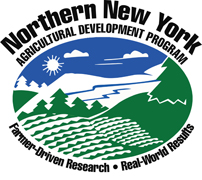
NNYADP-Funded Research Trials Evaluating Farmers’ Fall Planting Questions
September 6, 2024. Research funded by the Northern New York Agricultural Development Program (NNYADP) is addressing challenges raised by a regional focus group interested in the potential benefits of fall-planted cover crops.
“The focus group of regional farmers and agribusinesses expressed a need to identify cover crop varieties that will establish well specifically in northern New York’s colder soil and have increased winter season hardiness after a late fall planting in the region,” said project leader Dr. Virginia Moore, Ph.D., of the Cornell University School of Integrative Plant Science, Ithaca, New York.
Since the fall season of 2022, with NNYADP grant support, Dr. Moore and Dr. Julie L. Hansen, Ph.D., a plant breeding and genetics specialist with Cornell University, have been collecting data from cover crop trials on working dairy and vegetable farms in Clinton and Lewis counties, at Miner Institute in Chazy, the Willsboro Research Farm, and the Cornell Cooperative Extension Learning Farm in St. Lawrence County.
Fall-planted cover crops help reduce soil erosion and nutrient runoff, filter surface and ground water, add organic matter to the soil, reduce weeds and pests, and sequester carbon in the soil. However, Northern New York’s short growing season, climate conditions, and at times wet soil conditions pose barriers to the regional adoption of fall-planted cover crops.

The cover crop being evaluated is cereal rye. Dr. Hansen explains, “Cereal rye is the most common cover crop due to its unparalleled biomass production, weed suppression, and growth under colder climate conditions.”
The data being collected from the NNYADP cereal rye research plantings include soil composition, seedling emergence after various planting dates, winter survival, plant vigor, growth, the biomass of the cereal rye crop, and the weed pressure in the plots.
The fall planting dates in the trials across two year have ranged from September 25th to November 6th.
The Northern New York farmers participating in the trials will be surveyed in 2025 for feedback on results to date. Project collaborators include Happy Haven Farm in Mooers, New York; Dyer Farms in Plattsburgh, New York; Pominville Farms in Croghan, New York; Cornell University field crops; soils and dairy specialists; and personnel with the Soil and Water Conservation Districts in Clinton and Lewis counties.
Additional research is underway at breeding nurseries initiated at the Willsboro Research Farm, the Homer C. Thompson Vegetable Research Farm in Freeville, New York, and at the University of Minnesota: St. Paul. At those sites, Dr. Moore and Ph.D. student Raksha Thapa are selectively breeding cereal rye varieties with improved ability to emerge in colder soils and to produce sufficient biomass when planted in late fall. The crop populations at the breeding nursery sites are crosses of northern-adapted cereal rye varieties and southern-adapted and alleopathic breeding lines of cereal rye.
The NNYADP trial data are provided to a national Cover Crop Breeding Network, led by Dr. Moore, to broaden national-level field-based knowledge in support of cover crop improvement.
The 2022 and 2023 project reports for this cover crop research are publicly accessible at www.nyyagdev.org.
 Funding for the Northern New York Agricultural Development Program is supported by the New York State Legislature through the New York State Assembly and administrated through the New York State Department of Agriculture and Markets.
Funding for the Northern New York Agricultural Development Program is supported by the New York State Legislature through the New York State Assembly and administrated through the New York State Department of Agriculture and Markets.
Click here to read the 2023 NNYADP cereal rye cover crop trials report